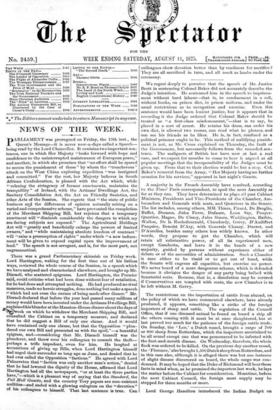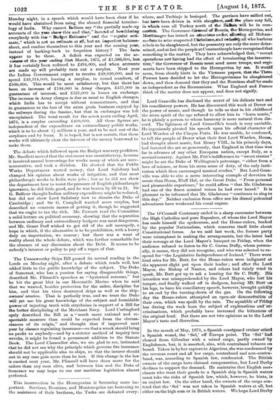Lord George Hamilton introduced the Indian Budget on
Monday night, in a speech which would have been clear if he would have abstained from using the absurd financial termino- logy of India. Why cannot &diens say the partially made-up accounts of the yew show thin and that,' instant of botilcTeising everybody with the " aulget gstiranta" and the " regular esti-
mate," which is not an estimate at alt,-but insperfeebbalance- sheet, and confine themselves to this year and the coming year, instead of harking-back to forgotten history ? The faots. appear to be these. A deficit was expected on the ac- cowers' the-year ending 31st March, 1875, of £1,386,000,-butt1 it has certainty been reduced to 1491,000, and when accounts are matte up will probably turn out a surplus. Next year the Indian Government expect to receive 149;820,000, and to spend £49,314,000, leaving a surplus, in round numbers, of £500,000, This would be most satisfactory, but that therehas been an increase of 2184,000 in Army charges, 1431,000 in 1 guarantees of interest, and £521,000 in losses on exchange.
The increase in Army charges is due as usual to English changes, which India has to accept without remonstrance, and that in guarantees to the loss of the extra grain business enjoyed by the railways during the famine, but that in exchanges was left unexplained. The total result for the seven years ending April, 1876, is a surplus exceeding £400,000. All these figures are independent of the expenditure on extraordinary public works, which is to be about 41 millions a year, and to be met out of the surpluses and by loans. It is hoped, but is not certain, that these works will ultimately clear the interest of the money borrowed to make them.































 Previous page
Previous page